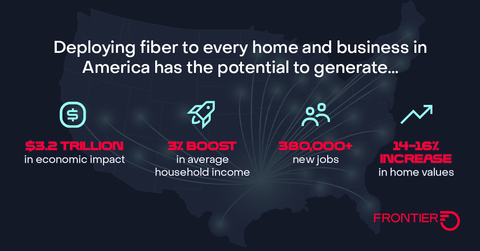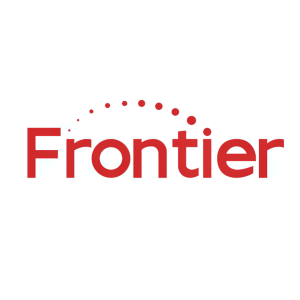Frontier Releases New Study That Reveals Fiber Deployment Can Boost the U.S. Economy by Over $3 Trillion
First-of-its-kind economic study highlights the benefits of increased investment in fiber deployment

(Graphic: Business Wire)
What happened: Frontier, in partnership with the Fiber Broadband Associated (FBA), today published a new study that finds deploying fiber in the
Why it matters: The
The breakdown: This study is the first to quantify the significant incremental economic benefits of fiber deployment, even in the presence of other high-speed broadband technologies like cable. According to this fresh research, here’s how fiber deployment in the
-
Deploying fiber to the 56 million
U.S. households unserved by fiber can generate$1.64 trillion -
Fiber deployment can increase household income by
$1.6 trillion -
Fiber deployment has the potential to create at least 380,000 new jobs in the
U.S. economy.
Handy quote: “We are building the critical digital infrastructure this country needs to succeed in the digital economy. Fiber is the best technology for connecting homes and businesses – it’s fast, reliable and capable of meeting our customers’ needs today and into the future,” said Nick Jeffery, CEO of Frontier. “This study provides us with data that shows the incredible impact that our fiber technology can have on individuals, communities and the
The FBA weighs in: “This study makes it clear: when it comes to closing the digital divide for the long term, government programs need to prioritize funding for fiber over any other high-speed connections. Investing in fiber is key to unlocking substantial economic and social benefits,” said Gary Bolton, Fiber Broadband Association CEO. “With over
Who did the study? Frontier and the FBA commissioned The Brattle Group to conduct the research for this study. The Brattle Group answers complex economic, regulatory, and financial questions for corporations and governments around the world. Their work is distinguished by the credibility of their experts, which include 500 leading international academics and industry specialists across
About Frontier
Frontier (NASDAQ: FYBR) is the largest pure-play fiber provider in the
About the Fiber Broadband Association
The Fiber Broadband Association is the largest and only trade association that represents the complete fiber ecosystem of service providers, manufacturers, industry experts, and deployment specialists dedicated to the advancement of fiber broadband deployment and the pursuit of a world where communications are limitless, advancing quality of life and digital equity anywhere and everywhere. The Fiber Broadband Association helps providers, communities, and policy makers make informed decisions about how, where, and why to build better fiber broadband networks. Since 2001, these companies, organizations, and members have worked with communities and consumers in mind to build the critical infrastructure that provides the economic and societal benefits that only fiber can deliver. The Fiber Broadband Association is part of the Fibre Council Global Alliance, which is a platform of six global FTTH Councils in
View source version on businesswire.com: https://www.businesswire.com/news/home/20241120922301/en/
Media
Chrissy Murray
VP, Corporate Communications
chrissy.murray@ftr.com
Source: Frontier Communications Parent, Inc.








